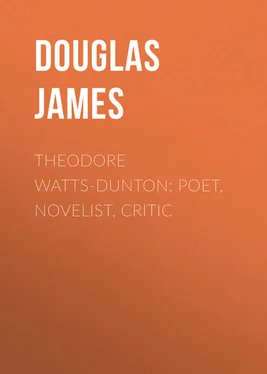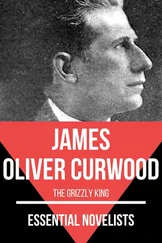James Douglas - Theodore Watts-Dunton - Poet, Novelist, Critic
Здесь есть возможность читать онлайн «James Douglas - Theodore Watts-Dunton - Poet, Novelist, Critic» — ознакомительный отрывок электронной книги совершенно бесплатно, а после прочтения отрывка купить полную версию. В некоторых случаях можно слушать аудио, скачать через торрент в формате fb2 и присутствует краткое содержание. Жанр: literature_19, foreign_antique, foreign_prose, Биографии и Мемуары, на английском языке. Описание произведения, (предисловие) а так же отзывы посетителей доступны на портале библиотеки ЛибКат.
- Название:Theodore Watts-Dunton: Poet, Novelist, Critic
- Автор:
- Жанр:
- Год:неизвестен
- ISBN:нет данных
- Рейтинг книги:4 / 5. Голосов: 1
-
Избранное:Добавить в избранное
- Отзывы:
-
Ваша оценка:
- 80
- 1
- 2
- 3
- 4
- 5
Theodore Watts-Dunton: Poet, Novelist, Critic: краткое содержание, описание и аннотация
Предлагаем к чтению аннотацию, описание, краткое содержание или предисловие (зависит от того, что написал сам автор книги «Theodore Watts-Dunton: Poet, Novelist, Critic»). Если вы не нашли необходимую информацию о книге — напишите в комментариях, мы постараемся отыскать её.
Theodore Watts-Dunton: Poet, Novelist, Critic — читать онлайн ознакомительный отрывок
Ниже представлен текст книги, разбитый по страницам. Система сохранения места последней прочитанной страницы, позволяет с удобством читать онлайн бесплатно книгу «Theodore Watts-Dunton: Poet, Novelist, Critic», без необходимости каждый раз заново искать на чём Вы остановились. Поставьте закладку, и сможете в любой момент перейти на страницу, на которой закончили чтение.
Интервал:
Закладка:
Chapter V
EARLY GLIMPSES OF THE GYPSIES
Although an East Midlander by birth it seems to have been to East Anglia that Mr. Watts-Dunton’s sympathies were most strongly drawn. It was there that he first made acquaintance with the sea, and it was to East Anglia that his gypsy friends belonged.
On the East Anglian side of St. Ives, opposite to the Hemingford side already described, the country, though not so lovely as the western side, is at first fairly attractive; but it becomes less and less so as it nears the Fens. The Fens, however, would seem to have a charm of their own, and Mr. Watts-Dunton himself has described them with a vividness that could hardly be surpassed. It was here as a boy that he made friends with the Gryengroes – that superior variety of the Romanies which Borrow had known years before. These gypsies used to bring their Welsh ponies to England and sell them at the fairs. I must now go back for some years in order to enrich my pages with Mr. Watts-Dunton’s graphic description of his first meeting with the gypsies in the Fen country, which appeared in ‘Great Thoughts’ in 1903.
“I shall never forget my earliest recollections of them. My father used sometimes to drive in a dogcart to see friends of his through about twelve miles of Fen country, and he used to take me with him. Let me say that the Fen country is much more striking than is generally supposed. Instead of leafy quick hedgerows, as in the midlands, or walls, as in the north country, the fields are divided by dykes; not a tree is to be seen in some parts for miles and miles. This gives an importance to the skies such as is observed nowhere else except on the open sea. The flashing opalescent radiance of the sea is apt to challenge the riches of the sky, and in a certain degree tends to neutralize it; but in the Fen country the level, monotonous greenery of the crops in summer, and, in autumn and winter, the vast expanse of black earth, make the dome of the sky, by contrast, so bright and glorious that in cloudless weather it gleams and suggests a roof of rainbows; and in cloudy weather it seems almost the only living sight in the universe, and becomes thus more magical still. And as to sunsets, I do not know of any, either by land or sea, to be compared with the sunsets to be seen in the Fen country. The humidity of the atmosphere has, no doubt, a good deal to do with it. The sun frequently sets in a pageantry of gauzy vapour of every colour, quite indescribable.
The first evening that I took one of these drives, while I was watching the wreaths of blue curling smoke from countless heaps of twitch-grass, set burning by the farm-labourers, which stretched right up to the sky-line, my father pulled up the dogcart and pointed to a ruddy fire glowing, flickering, and smoking in an angle where a green grassy drove-way met the dark-looking high-road some yards ahead. And then I saw some tents, and then a number of dusky figures, some squatting near the fire, some moving about. ‘The gypsies!’ I said, in the greatest state of exultation, which soon fled, however, when I heard a shrill whistle and saw a lot of these dusky people running and leaping like wild things towards the dog-cart. ‘Will they kill us, father?’ I said. ‘Kill us? No,’ he said, laughing; ‘they are friends of mine. They’ve only come to lead the mare past the fire and keep her from shying at it.’ They came flocking up. So far from the mare starting, as she would have done at such an invasion by English people, she seemed to know and welcome the gypsies by instinct, and seemed to enjoy their stroking her nose with their tawny but well-shaped fingers, and caressing her neck. Among them was one of the prettiest little gypsy girls I ever saw. When the gypsies conducted us past their camp I was fascinated by the charm of the picture. Outside the tents in front of the fire, over which a kettle was suspended from an upright iron bar, which I afterwards knew as the kettle-prop, was spread a large dazzling white table-cloth, covered with white crockery, among which glittered a goodly number of silver spoons. I afterwards learnt that to possess good linen, good crockery, and real silver spoons, was as ‘passionate a desire in the Romany chi as in the most ambitious farmer’s wife in the Fen country.’ It was from this little incident that my intimacy with the gypsies dated. I associated much with them in after life, and I have had more experiences among them than I have yet had an opportunity of recording in print.”
This pretty gypsy girl was the prototype, I believe, of the famous Rhona Boswell herself.
It must of course have been after the meeting with Rhona in the East Midlands – supposing always that we are allowed to identify the novelist with the hero, a bold supposition – that Mr. Watts-Dunton again came across her – this time in East Anglia. Whether this is so or not, I must give this picture of her from ‘Aylwin’: —
“It was at this time that I made the acquaintance of Winnie’s friend, Rhona Boswell, a charming little Gypsy girl. Graylingham Wood and Rington Wood, like the entire neighbourhood, were favourite haunts of a superior kind of Gypsies called Gryengroes, that is to say, horse-dealers. Their business was to buy ponies in Wales and sell them in the Eastern Counties and the East Midlands. Thus it was that Winnie had known many of the East Midland Gypsies in Wales. Compared with Rhona Boswell, who was more like a fairy than a child, Winnie seemed quite a grave little person. Rhona’s limbs were always on the move, and the movement sprang always from her emotions. Her laugh seemed to ring through the woods like silver bells, a sound that it was impossible to mistake for any other. The laughter of most Gypsy girls is full of music and of charm, and yet Rhona’s laughter was a sound by itself, and it was no doubt this which afterwards, when she grew up, attracted my kinsman, Percy Aylwin, towards her. It seemed to emanate, not from her throat merely, but from her entire frame. If one could imagine a strain of merriment and fun blending with the ecstatic notes of a skylark soaring and singing, one might form some idea of the laugh of Rhona Boswell. Ah, what days they were! Rhona would come from Gypsy Dell, a romantic place in Rington Manor, some miles off, especially to show us some newly devised coronet of flowers that she had been weaving for herself. This induced Winnie to weave for herself a coronet of seaweeds, and an entire morning was passed in grave discussion as to which coronet excelled the other.”
Chapter VI
SPORT AND WORK
It was at this period that, like so many young Englishmen who were his contemporaries, he gave attention to field sports, and took interest in that athleticism which, to judge from Wilkie Collins’s scathing pictures, was quite as rampant and absurd then as it is in our own time. It was then too that he acquired that familiarity with the figures prominent in the ring which startles one in his reminiscences of George Borrow. But it will scarcely interest the readers of this book to dwell long upon this subject. Nor have I time to repeat the humorous stories I have heard him tell about the queer characters who could then be met at St. Ives Fair (said to have been the largest cattle fair in England), and at another favourite resort of his, Stourbridge Fair, near Cambridge. Stourbridge Fair still exists, but its glory was departing when Mr. Watts-Dunton was familiar with it; and now, possibly, it has departed for ever. Of Cambridge and the entire county he tells many anecdotes. Here is a specimen: —
Once in the early sixties he and his brother and some friends were greatly exercised by the news that Deerfoot, the famous American Indian runner in whom Borrow took such an interest, was to run at Cambridge against the English champion. When the day came, they drove to Cambridge in a dog-cart from St. Ives, about a dozen miles. The race took place in a field called Fenner’s Ground, much used by cricketers. This is how, as far as I can recall the words, he tells the anecdote: —
Читать дальшеИнтервал:
Закладка:
Похожие книги на «Theodore Watts-Dunton: Poet, Novelist, Critic»
Представляем Вашему вниманию похожие книги на «Theodore Watts-Dunton: Poet, Novelist, Critic» списком для выбора. Мы отобрали схожую по названию и смыслу литературу в надежде предоставить читателям больше вариантов отыскать новые, интересные, ещё непрочитанные произведения.
Обсуждение, отзывы о книге «Theodore Watts-Dunton: Poet, Novelist, Critic» и просто собственные мнения читателей. Оставьте ваши комментарии, напишите, что Вы думаете о произведении, его смысле или главных героях. Укажите что конкретно понравилось, а что нет, и почему Вы так считаете.









